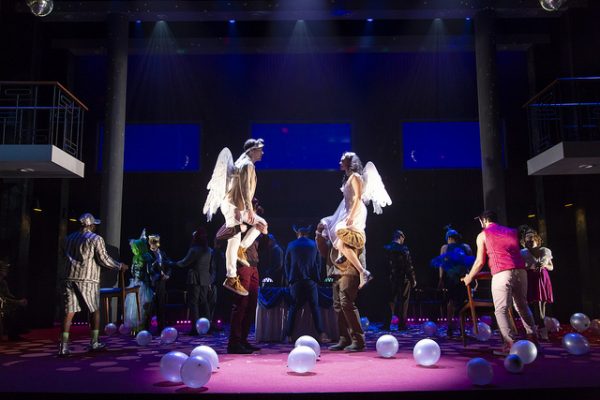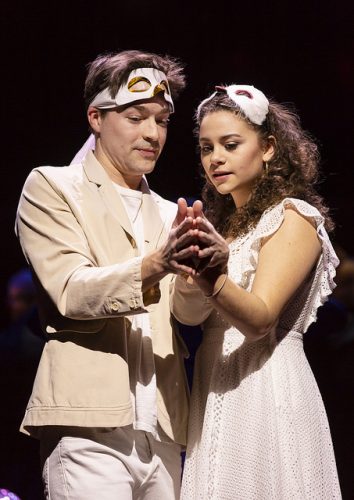Theater Review: HTC’s “Romeo and Juliet” — A Seamless Marriage between Old and New
By Erik Nikander
The HTC’s Romeo and Juliet may be dressed in modern trappings, but the play’s elemental heart and soul are left fully intact.
Romeo and Juliet by William Shakespeare. Directed by Peter DuBois. Staged by the Huntington Theatre Company at the Avenue of the Arts / Huntington Avenue Theatre (264 Huntington Avenue, Boston), through March 31.

The cast of “Romeo and Juliet” in the Huntington Theatre Company production. Photo: T. Charles Erickson.
It is enough to make a skeptic’s heart sink: the Huntington Theatre Company’s website describes their current production of Romeo and Juliet as “thrillingly modern” and “astoundingly current,” boasting “nods to the political fractures of our current era.” These descriptors make it easy to imagine the the worst-case scenario: a production team worried that Shakespeare’s tragedy would bore a modern crowd unless they inserted, say, references to the floss dance or well-meaning but impotent jabs at Trump. But glory be, such fears are, thankfully, unfounded. The HTC’s Romeo and Juliet may be dressed in modern trappings, but the play’s elemental heart and soul are left fully intact.
Rather than force clumsy comparisons to contemporary political realities, director Peter DuBois and his creative team wisely let the tragedy play out before our eyes. They provide the audience the crucial freedom to draw its own conclusions. Comparing the conflict between the Montagues and Capulets to current ideological combat is too easy; but there are moments and scenes that reflect today’s complex tussles. One in particular: the first scene after the intermission, the aftermath of Tybalt’s murder at Romeo’s hand. Uniformed officers surround the area; passerby mill about, distraught and confused and full of regret. Lady Capulet weeps over her family member’s corpse. An air of despondent fury in response to senseless, pointless violence simmers throughout the scene. The resonances with the rush of emotion that greets the shooting of an unarmed black man by the police are unmistakable.
Of course, Romeo and Juliet isn’t just about grief and misery. At the narrative’s center is the joy and excitement of young love, a passion that the show’s two leads channel with ease. George Hampe’s turn as Romeo is the standout of the show by far, a performance that’s continually riveting because it comes off as spontaneous. Many of Romeo’s lines, especially during the famous balcony scene, have been more or less drilled into the public consciousness. Hampe makes these careworn speeches feel fresh, like an idealistic poet determined to match words to his all-encompassing feelings. He surrenders (with skill) to the character’s mercurial nature, in the course of the a single scene darting from ecstasy to despair to bratty petulance. Hampe brings a raw honesty to Romeo’s wonder and heartbreak.
She doesn’t leave quite the same gut-wrenching impact as her co-star, but Lily Santiago supplies a striking Juliet. Like Hampe, she dives headfirst into the frustrations of youth; she also expresses, with clarity, the struggle of a young woman against society’s moral restrictions. The two actors share a knowing and believable chemistry generated by the innocent and joyful dance of first love. Santiago’s monologues are compelling as well, though they are hampered by a slight air of self-consciousness. She recites her lines with considerable presence and feeling, but they still feel a bit too grounded, more akin to recitations than true outpourings of emotion.

George Hampe and Lily Santiago in the HTC production of “Romeo and Juliet.” Photo: T. Charles Erickson.
The rest of the cast is exceptional. Matthew J. Harris’s bawdy, amped-up take on Mercutio is plenty of fun to watch; he’s faithful to the human core of the character while imbuing him with an obnoxious party-guy energy that feels wholly modern. Nancy E. Carroll as Juliet’s nurse and Will Lyman as Friar Lawrence deliver subtle and gripping performances; their quiet wisdom counters the youthful passion that drives the conflict. As Lord and Lady Capulet, Maurice Emmanuel Parent and Marianna Bassham are convincingly heartbreaking as refined, upper-class parents whose seemingly perfect lives are shattered by grief.
Exceptional performances aside, the Huntington’s Romeo and Juliet is a visual treat through and through, striking just the right balance between past and present. Russell H. Champa’s lighting work is stunning, drawing from a broad palette that ranges from warm light streaming through church windows to harsh fluorescents that lend scenes a deathly pallor. He also has found a way to supply an ethereal quality, thanks to lights that have been built, ingeniously, into moving set pieces. The costumes from Ilona Somogyi provide the play’s world with ample color and character, especially during the feast at the Capulets’ home, which rendered as a sort of decadent rave with revelers dressed up in animal masks. Perceptively, she dresses Romeo and Juliet as doves, at once conveying their innocence and drawing an archetypal connection between the star-crossed lovers.
Despite the production’s overall creative excellence, a few sour notes linger. The opening fight scene, a brawl between the Capulets and Montagues, comes off as an odd blend: an exaggerated kung-fu fight combined with a rumble between teen gangs in a ’50s movie. Bizarrely, the Capulet and Montague parents join in the fray, beating the hell out of each other with abandon. The intent might have been suggest an all-consuming vision of domestic warfare, but the result is stilted and silly. Fortunately, fight directors Rick Sordelet and Christian Kelly-Sordelet redeem themselves with the confrontation between Romeo, Mercutio, and Tybalt. Unlike the opening fray, this fight is brutal and bloody, choreographed with shocking, cold-steel precision.
But why dwell on the few negatives when this Romeo and Juliet does so much more right than wrong? Its approach to Shakespeare’s tragedy is faithful without feeling stodgy, modern in a way that never resorts to cheap references or political gimmickry. DuBois and his team of artistic collaborators have, unlike the families in Romeo and Juliet, managed to find a harmonious marriage, a happy fusion between old and new.
Erik Nikander is a critic, playwright, and filmmaker based in the New England area. His film criticism can be read on Medium and his video reviews on a variety of topics can be viewed on Youtube at EWN Reviews.

Just saw this R&J and loved it. Read both your review and Don Aucoin’s in the Globe afterwards and I wholeheartedly agree with everything you’ve written. Loved Romeo. Hope we see more of him.
Saw a “modern” production of R&J at the ART years ago and was so aghast that I stopped going there for a few years. DuBois and HTC, on the other hand, nails it.
I thought the leads pulled off the interpretation beautifully – showing madness on the scale of a Lear or Hamlet – but only after a perfect display of adolescent charm and wonder that accompanies first love and first heartbreak.